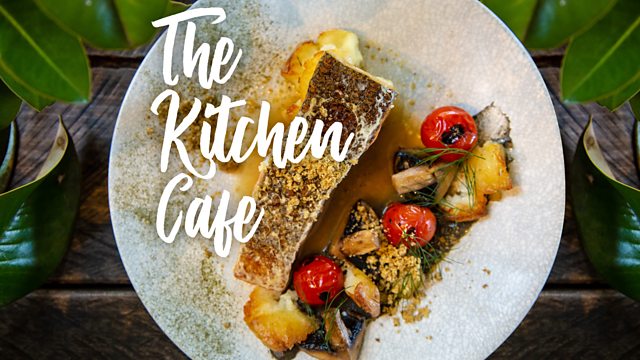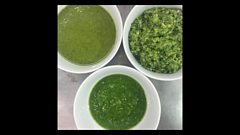
01/12/2016
Clare English talks to alchemist and author Dearbhla Reynolds about fermentation, Karen MacKenzie tries making yoghurt, and chef John Quigley demonstrates fast pesto recipes.
Celebrating the sheer joy of all things foodie! As well as helping you cook up a storm in your own kitchen with a wide range of exciting seasonal ingredients, it's a series about the stories behind those ingredients - who's producing what, where and how in Scotland.
Presented by Clare English, each week The Kitchen Cafe delves into a range of topical and seasonal subjects. Alongside great recipe suggestions we'll be exploring food history and trends in food and nutrition as well as recognising - but most of all enjoying - the essential role food plays in all aspects of contemporary Scottish life.
From cooking with the kids to feeding the family, from treating yourself to a meal out to entertaining friends or creating a romantic dinner for two, we want to help you get the best out of your kitchen and the best out of the amazing range of produce Scotland has to offer. Each week there will be recipes to download and keep plus regular culinary tips from some of Scotland's top chefs and cooks so you can recreate their delicious ideas at home.
ΒιΆΉΤΌΕΔ Radio Scotland's The Kitchen Cafe...making radio taste better than ever!
Last on
Clip
-
![]()
John Quigley's Recipe for Pesto
Duration: 02:17
Kitchen Cafe Recipe: Cranberry Relish.
There is really only one time of year that we allow cranberries some space on our tables. Rather unfortunate really as I consider it the mid-winter vitamin C shot to help us break down all that over indulgence.
This ferment will change your mid-winter traditional dinner forever and hopefully find its way onto other plates
Makes 250ml jar
135g of whole cranberries
juice from 2 tangerines or 1 orange
2 inch hunk of ginger, grated
2 Tbsp raw honey or maple syrup
1 Tbsp brine (from another ferment) or water kefir or whey (optional)
1/2 tsp sea salt
1 cinnamon stick
3 whole clovesΒ
Process the berries along with the other ingredient. If using a starter then add it here. NextΒ add the salt and grated ginger to the mix
Juice the tangerines or orange adding it to the mix followed by the honey or maple syrup.
Give this a quick whirr to incorporate all the flavours and transfer to a clean jar, lastly adding the cloves and cinnamon stick.
Place in a jar out of direct sunlight in a corner of your kitchen to ferment for 5 days. When youβre happy with the taste and texture, transfer to the refrigerator. Will keep for a few weeks. Β
This relish is not just for Christmas dinner.Β Try it on top a delicious breakfast porridge, with savoury pancakes or alongside any meats for improved digestion of protein.
Kitchen Cafe Recipe: Christmas Sauerkraut
Whilst there are flavours that work, whether being passed down through generations, circulated amongst fermented friends or created with culinary consideration, there is never a limit to experimenting.Β The worst thing that can happen is it is not a pleasant resultβ¦β¦..as a kraut.
1 head red cabbage
500gΒ raw cranberries
3 mandarins, zest and juice
1 lemon, zest
juice of Β½ lemon
2 inch knob of ginger, shredded
1-2 cups dehydrated cane juice or coconut palm sugar
1 teaspoon ground cinnamon or 4 sticks of cinnamon
2 T unrefined sea saltΒ
Remove the outer leaves of the cabbage it they are looking a bit grim. If they look good, wash them, to make sure there is to soil.
Chop the cabbage, cutting out the core.
I like to chop it reasonably fine. ( use your food processor of you have one, naturally)
Place the sliced cabbage in a bowl and add the salt, giving it a quick massage through.
I let sit for 30-60 minutes until it starts to sweat, it does some of the hard work for you.
Mix in all the other ingredients
The mix should be quite wet now.
Begin to fill your Jar or your crock pot, taking a handful at a time and pressing down very hard using your fist/other implement. With each handful youβll notice a little more liquidΒ
Keep filling the jar, until you have it filled to 1β of the top of the jar and the liquid is covering the cabbage completely.Β This provides an anaerobic environment within which the fermentation can take place.
For successful fermenation, keeping the cabbage submerged is crucial, so place a weight on it.Β Leave to sit for anything from 1-6 weeks. Feel free to taste it every few days to gauge the progress of the fermentation flavour.Β If you are fermenting in an air tight jar, then burping every few days to release the CO2 build up is important.
When you are happy with the flavour and texture, store in the fridge.Β The times will vary with room temperature and other factors.Β After a week the good bacteria are considered established, and it is good to eat but if you want maximum probiotics in your sauerkraut, youβll want to let your ferment go through the three stages of fermentation.Β This can take up to 4 weeks.
Broadcasts
- Thu 1 Dec 2016 13:30ΒιΆΉΤΌΕΔ Radio Scotland
- Sun 4 Dec 2016 07:30ΒιΆΉΤΌΕΔ Radio Scotland
Podcast
-
![]()
The Kitchen CafΓ©
Celebrate the joy of Scotland's larder with recipes, reviews, tips and delicious ideas!


